Adrian Collins's Blog, page 153
December 14, 2021
REVIEW: Dames for Hire by S.C. Jensen
Dames for Hire is a prequel spin-off of the Bubbles in Space series by S.C. Jensen. Bubbles in Space is a Neo-Noir thriller series set in HoloCity, a cyberpunk dystopia. Without spoiling, her private eye career takes something of a sideline to larger events so this seems to be based on the kind of cases she took before the first book. In other words, the main series is cyberpunk adventure while this is more detective series. I’m entirely cool with that.
[image error]In this book, a rich client comes to Bubbles looking to have someone rubbed out in order to protect his daughter from being taken advantage of. Bubbles isn’t into contract murder but agrees to investigate the potential target for the good of the customer’s stepdaughter. What follows is a story of sex, gambling, inheritance, and Bubbles trying to do a job she is uniquely unqualified for. The ending is also a classic “locked room” with the killers that I loved the update to.
The appeal of this book is that it manages to do what the main series was unable to do and keep a focus on the detective fiction element of Bubbles’ story. Bubbles is a somewhat questionably skilled investigator as she’s frequently distracted by her own troubles as well as lacking in the hyper-observation that other fictional detectives possess. This is an interesting twist as Bubbles upfront and somewhat bumbling nature frequently leads her enemies to overestimate her throughout the book. This results in them leading a trail right back to their doorsteps.
Bubbles is an exceptionally likeable character with a sarcastic and everywoman quality to her. She doesn’t want to be involved with a client whose first response to a situation is to have his daughter’s girlfriend rubbed out. However, Bubbles is running low on funds and her client is her best friend’s boss. She thinks she can navigate things and keep the bloodshed to a minimum but Bubbles is never quite as on top of things like she wants to be. This makes the story dynamic and fairly unpredictable.
HoloCity is a delightfully sleazy place without ever going over PG-13 in terms of sex or violence. S.C. Jensen does a great job of using 1930s lingo in the future to give it an “off” feel while also filling its wealthy classes with every manner or perversion but letting the reader figure out just what it means. It was a bit like trying to adapt The Maltese Falcon and The Big Sleep during the era of the Hayes Code as both films are based on books that are gritty as hell. The cyberpunk element adds a fun veneer of futurism to very familiar tropes of crime bosses, greed, addiction, and questionably trustworthy lovers.
I’m a great believer that detective fiction and cyberpunk go together like peanut butter and jelly so this is a combination that was straight up my alley. Unfortunately, I will say the book is a bit on the short side with only a little over 144 pages. The price is reasonable with $2.99 for a direct purchase and also availability on Kindle Unlimited. Still, I think the story could have been expanded to two hundred pages easily enough. I understand this is going to be a series around Bubbles’ cases so its compact self-contained size makes sense.
So, definitely recommended.
Read Dames for Hire by S.C. Jensen
The post REVIEW: Dames for Hire by S.C. Jensen appeared first on Grimdark Magazine.
December 13, 2021
REVIEW: Engines of Empire by R. S. Ford
Engines of Empire is the first in the new fantasy trilogy The Age of Uprising by R. S. Ford. Readers may be familiar with Ford from his earlier fantasy trilogies Steelhaven and War of the Archons or have come across him as historical fiction writer Richard Cullen.
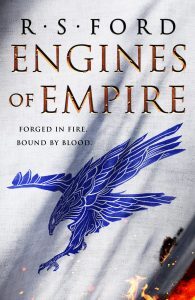 This novel is a fantastic traditional epic fantasy and I think the trilogy could become one of the classics of our genre. The novel is incomparable (although I shall try and do it justice) to any I have come across before, but this series would be perfect for fans of Brent Weeks, George R R Martin or David Gemmell. I do not make the comparison to Gemmell lightly and for me there can be no higher compliment as I credit Gemmell with being my gateway into adult fantasy fiction. The fact that I hold Ford’s Engines of Empire close to that hopefully shows how much I have enjoyed it.
This novel is a fantastic traditional epic fantasy and I think the trilogy could become one of the classics of our genre. The novel is incomparable (although I shall try and do it justice) to any I have come across before, but this series would be perfect for fans of Brent Weeks, George R R Martin or David Gemmell. I do not make the comparison to Gemmell lightly and for me there can be no higher compliment as I credit Gemmell with being my gateway into adult fantasy fiction. The fact that I hold Ford’s Engines of Empire close to that hopefully shows how much I have enjoyed it.
Engines of Empire is set in the vast nation of Torwyn, where Ford has created a rich and believable world that never once seems overwhelming or too complex. Torwyn is an industrialised nation, powered by the magical resource pyrestone and the industry of Torwyn is overseen by different guilds. The guild family with the most influence, and a tenuous hold on power, are the Hawkspurs. The key members of the Hawkspur family provide the focus of the multiple points of view in Engines of Empire with the heading of each chapter indicating the current perspective.
First, there is matriarch Rosomon. Rosomon Hawkspur is a widow with three adult children and has manged to maintain her Guild control for decades. In an effort to continue Hawkspur dominance she has raised her children to be experts in the areas that would be of the most importance to Torwyn: military command, controlling the pyrestone supplies, and creating the machines they control. Her eldest son Conall, is the military mind based at a desolate frontier settlement, where he has to prove he is more than a bought commission in a fancy uniform and the first murmurs of a revolution against the Guilds is a threat he never imagined. Tyreta is the only Hawkspur daughter and able to wield a magical connection to pyrestone. She would be an ideal heir to lead their Guild, if she was not the completely wrong temperament. Tyreta is sent to the pyrestone mines to oversee supply of this most precious commodity and learns more than she ever wanted to about the darker sides of industry. Finally there is the youngest son, Fulren. As a talented artificer Fulren is an inventor of machines powered by pyrestone and would be most happy left alone to tinker in his workshop. But he finds himself thrust into a less than friendly foreign country after he is framed for a crime that could ignite a war. A war which Torwyn may struggle to win.
The Hawkspur family provide a net that Ford is able to cast over his entire world and Engines of Empire moves between the different characters and their settings effortlessly. Multiple perspectives can sometimes feel clunky but this is not the case here. Each point of view is believable and engaging, and for a narrative that moves between people and place it never loses the flow of each individual storyline or how they weave in to the wider plot. A large part of Engines of Empire is the “coming of age” arcs of the younger Hawkspurs, but there are a lot of other fantasy tropes at work without feeling clichéd. Ford has not only given us magical machines, but fantastical beasties, sorcery, huge battles, religious conflict and enough political intrigue to make this a good solid epic fantasy. Engines of Empire is not a fairy tale though, a happy ending is not guaranteed, the characters are imperfect, and although the Hawkspurs are the back bone and heart of the novel I did not always like them. However, as this review is for Grimdark Magazine I must point out that it is not a grimdark, or even a dark fantasy, novel. Many of the things we have come to expect from grimdark are not present here: swearing is mild and infrequent, the protagonists are almost entirely the good guys, sex scenes are implicit, any violence is not gratuitous and although there are dark aspects to the story it never feels hopeless or amoral. What Engines of Empire is, is the best traditional epic fantasy I have read in years.
Engines of Empire is beautifully written, and I knew from the first paragraph of the prologue when Ford wrote ‘fear gnawed at him like a starving hound, cracking his bones and licking at the marrow’ that it would be a great novel. It is vicious and awful and dreadful and terrific in equal parts. It got better with every page and I resented having to stop reading it and do real life things. There is a clear narrative voice for each of the perspectives so it never felt confusing or difficult to follow, even though the world is so large and there are so many characters. The Dramatis Personae at the beginning of the novel was very useful to refer back to early on, but I found I did not need it the more engrossed in the story I became. Torwyn is an authentic and original world and although Ford has used almost universal focuses of family or political power struggles that readers have almost certainly come across before, Engines of Empire genuinely does not read like anything else I have ever read.
This book will stand the test of time and I think will be enjoyed by fantasy readers for years. I will be rereading it just because I can and because I have to wait to get my hands on book two.
I would like to thank Orbit Books for sending me an Advanced Reader Copy of Engines of Empire to be able to review it. You can read an excerpt of chapter one, here.
Read Engines of Empire by R. S. Ford
The post REVIEW: Engines of Empire by R. S. Ford appeared first on Grimdark Magazine.
December 12, 2021
The works of Fritz Leiber
Fritz Leiber was an incredibly prolific author, who won numerous awards during his life for works that nowadays seem more obscure than they should be. In addition to writing, he was a chess master, fencer, and Shakespearean actor. While most popular for the sword and sorcery duo Fafhrd and the Gray Mouser, he wrote horror, urban fantasy, and science fiction just as easily.
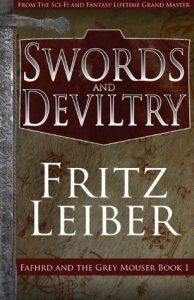 Leiber’s most popular creation are the duo of Fafhrd and the Gray Mouser. Fafhrd is a huge tundra-born barbarian, while the Gray Mouser is a sneakier thief. The first was published in 1939, and the last one in 1988. Neither of them is a sidekick to the other. Instead, they’re two halves of a heroic soul.
Leiber’s most popular creation are the duo of Fafhrd and the Gray Mouser. Fafhrd is a huge tundra-born barbarian, while the Gray Mouser is a sneakier thief. The first was published in 1939, and the last one in 1988. Neither of them is a sidekick to the other. Instead, they’re two halves of a heroic soul.
During their adventures, they battled men, magicians, and monsters, were in the power of two bizarre wizards who obviously did not have their best interests at heart, faced down the incarnation of death, survived the poverty of lean times in Lankhmar, climbed the world’s largest mountain on a whim, and plenty more. Their quests were often them following a rumour for fun or profit, with no grander schemes in mind.
Both had several named weapons of special import, but given the number of times they lose them, those names are just applied to whichever new similar weapon they happen to have.
They each had one origin story without the other, explaining Fafhrd leaving his snowy home and the Gray Mouser’s origins as an apprentice under a wizard. Then, in Ill Met in Lankhmar they met, by both ambushing the same people at the same time in an attempt to steal the same treasure. There is simply no introduction that could have ever been more perfect for these two.
Fafhrd and the Gray Mouser also feel like the closest books have ever gotten to a fun tabletop role-playing game, like Dungeons and Dragons. (And Lankhmar is a huge inspiration for D&D, even getting its own official tie-in booklet.) Indeed, the Fafhrd and the Gray Mouser series feels closer to those games than any of the tie-in novels. Weird magic, exploring ruins looking for treasure and spending it all at the tavern, plans that should absolutely not work but somehow do—heck, there’s even a story where they both die and then face down Death, as if the game master is trying to retcon a total party kill.
They were a huge inspiration on several current authors, including Paul S Kemp and Scott Lynch (Lynch’s A Year and a Day in Old Theradane was a direct homage to a story in which Fafhrd and the Gray Mouser steal a house.) Michael Chabon gave them a solid tip of the hat in Gentlemen of the Road.
Read these stories in Swords and Deviltry by Fritz Leiber
If you liked Fafhrd and the Gray Mouser you might also like Our Lady of Darkness by Fritz Leiber.
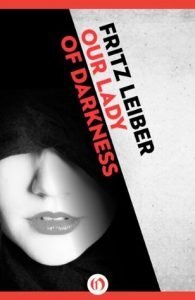 Our Lady of Darkness won the World Fantasy Award for Best Novel. It followed Franz Westen, a widower, who learns of the occult art of megapolisomancy, the magic of large cities, in San Francisco. The book is more overt about Leiber’s love of Jungian mythemes, and also touches on Leiber’s own life more thoroughly than anything else he had written. Westen was a widower turning into an alcoholic after the death of his wife, much like Leiber, and the address he lives at was also Leiber’s. While it’s never terrifying it maintains a lingering, evocative unease. It was expanded from The Pale Brown Thing, which was published over two issues of the Magazine of Science Fiction and Fantasy, and Leiber claimed the two ‘should be regarded as the same story told at different times.’ Our Lady of Darkness is also, hands down, my favorite story Leiber ever wrote.
Our Lady of Darkness won the World Fantasy Award for Best Novel. It followed Franz Westen, a widower, who learns of the occult art of megapolisomancy, the magic of large cities, in San Francisco. The book is more overt about Leiber’s love of Jungian mythemes, and also touches on Leiber’s own life more thoroughly than anything else he had written. Westen was a widower turning into an alcoholic after the death of his wife, much like Leiber, and the address he lives at was also Leiber’s. While it’s never terrifying it maintains a lingering, evocative unease. It was expanded from The Pale Brown Thing, which was published over two issues of the Magazine of Science Fiction and Fantasy, and Leiber claimed the two ‘should be regarded as the same story told at different times.’ Our Lady of Darkness is also, hands down, my favorite story Leiber ever wrote.
With the wild variety of both genre and tone in Leiber’s books, I’d recommend his work to nearly anyone interested in speculative fiction. And if you want charming, stylish, fun sword and sorcery, Fafhrd and the Gray Mouser will remain at the top of that particular mountain, that they climbed, on a whim.
Read Our Lady of Darkness by Fritz Leiber
The post The works of Fritz Leiber appeared first on Grimdark Magazine.
December 11, 2021
REVIEW: Arcane S1
Incredible art design and a story that pulls you in from the first episode and doesn’t let go, Arcane S1 is one of the best shows you will see in some time. Based on the popular League of Legends videogame, the show presents the stories of some of the characters from the game in beautiful style. Along with Castlevania and The Witcher, Arcane S1 breaks the curse of videogame adaptations and proves that TV series based on games can be as good as anything else on the small screen.
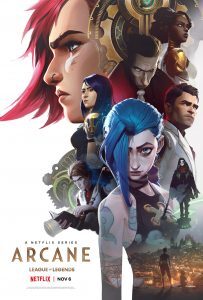 Admittedly, I had low expectations as I started the series. The game has never held my interest but the unique animation style and trailer drew me in. Arcane S1 tells a gripping political tale full of magic and intrigue as we follow a plethora of characters living in the affluent Piltover and the ghetto-like Undercity. Told in three parts over nine episodes, the story begins in heart-breaking fashion as we follow sisters Vi and Powder. A battle between Undercity citizens and Piltover police lead to the death of the sisters’ parents and the girls are left in the wreckage in a grim opening scene before being taken in by their motley crew of an adoptive family. In Arcane S1, there is a clear divide between those living the high life in Piltover and those struggling in the Undercity. The tension between the two sides is clear and one small spark could set the whole place on fire.
Admittedly, I had low expectations as I started the series. The game has never held my interest but the unique animation style and trailer drew me in. Arcane S1 tells a gripping political tale full of magic and intrigue as we follow a plethora of characters living in the affluent Piltover and the ghetto-like Undercity. Told in three parts over nine episodes, the story begins in heart-breaking fashion as we follow sisters Vi and Powder. A battle between Undercity citizens and Piltover police lead to the death of the sisters’ parents and the girls are left in the wreckage in a grim opening scene before being taken in by their motley crew of an adoptive family. In Arcane S1, there is a clear divide between those living the high life in Piltover and those struggling in the Undercity. The tension between the two sides is clear and one small spark could set the whole place on fire.
Arcane S1 moves at a great pace. It allows for enough time to allow the main characters to claw their way into the viewer’s mind before picking up the pace with some explosive action in the stunning style that mixes, fantasy, sci-fi, and steampunk with an incredible hand-painted look. However, it is not just a pretty series, it has more substance than most series released over the past few years. There’s a host of morally grey characters in the series with many of the heroes and heroines feeling forced to make difficult decisions due to the nature of their lives and the world around them. Arcane S1 deals with the big question of ‘what makes heroes and villains?’. It is a question that has been asked in many mediums before but it is done to such a high standard in the series that I’m unsure that there is anything that surpasses it. Even the villainous Silco had me feeling sympathy for him during a few moments in the show. There is a weariness to the characters, even those living in prosperous Piltover. The series is able to look at the cost of progress and the price that must be paid as some people live in comfort whilst others suffer in darkness. Those living in poverty and pain turn to drugs, drink, crime, and anything else they can to survive. The show is a timely reminder of what happens when there is a great divide between rich and poor and the dangers of the elite hoarding wealth instead of sharing it amongst people who need it the most.
It is the relationships between the characters that stand out in Arcane S1. The slow burn of Vi and Caitlyn’s relationship had me almost shouting at the screen as I wanted them to acknowledge the strength of their feelings for one another. Whilst this stood out for me, every character in the series had realistic, complex relationships with those around them. The villains showed heart in tender moments and the heroes showed that they were willing to go to great (and sometimes dangerous) lengths to save the people they loved. The series puts its characters through hell and those who survive these traumatic events come out scarred and changed, both mentally and physically. It is refreshing to see a series give time to portraying the effects of grief, despair, and suffering in such a complex and interesting way. Nothing is brushed aside for the sake of a cheap scene or throwaway line. The characters suffer and develop in ways that seem natural and progressive for the story.
Arcane S1 is a stunning adaptation that is further proof of Netflix’s Midas touch regarding tv series based on videogames. Castlevania and The Witcher were obviously not lucky hits from the streaming giant and in all honesty, Arcane S1 is the best of the lot and that is high praise. Beautiful animation, a heart-breaking story, top quality music including a banger from Imagine Dragons, and characters you will fall in love with. Arcane S1 is the best tv series of 2021.
The post REVIEW: Arcane S1 appeared first on Grimdark Magazine.
December 10, 2021
REVIEW: Reminiscence (2021)
Reminiscence is a movie that very strongly reminds me of a forgotten cult-classic called Strange Days starring Ralph Fiennes, Angela Bassett, Juliette Lewis, and Tom Sizemore. It was directed by Kathryn Bigelow and written by James Cameron and Jay Cocks. It takes a lot of the elements of that film about a conspiracy, memory recordings, and civil unrest then adds elements of Chinatown as well as Alfred Hitchcock. It also updates the setting from then near-future 1999 to a global-warming ravaged Florida.
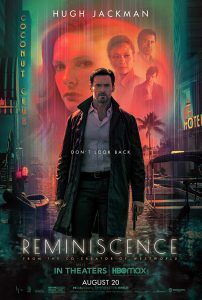 The premise is Nick Bannister (Hugh Jackman) and Watts (Thandiwe Newton) run a memory business. In a future where humans have to stay indoors during the day, most of the coastline is sunk beneath the waves, and the rich live on artificial islands, people love remembering the good times. This isn’t quite as advanced as Total Recall‘s artificial fantasies but you can be made to recall sex, your dead loved ones, and more. Certainly, I’d see a big market for it.
The premise is Nick Bannister (Hugh Jackman) and Watts (Thandiwe Newton) run a memory business. In a future where humans have to stay indoors during the day, most of the coastline is sunk beneath the waves, and the rich live on artificial islands, people love remembering the good times. This isn’t quite as advanced as Total Recall‘s artificial fantasies but you can be made to recall sex, your dead loved ones, and more. Certainly, I’d see a big market for it.
A seemingly chance encounter with a beautiful lounge singer named Mae (Rebecca Ferguson) results in Nick becoming pathologically obsessed with her. She vanishes about six months into their relationship and he spends most of his time trying to track her down despite the fact it’s increasingly clear she was involved in organized crime as well as lying to him. Nick’s obsession alienates his business partner, not the least because it’s clear she has a thing for him as well.
What follows is a well-written but somewhat standard film noir with Mae’s disappearance tied to a land swindler, a bastard child, adultery, and a series of lies. There’s unrequited love, film noir narration, and obsession that mark all of the hallmarks of a classic tale of man going down the mean streets who is not mean. The fact it comes with a cyberpunk setting where the rich thrive while the poor are left to live in half-Venice/half-Mad Max should make the film fantastic.
It’s not.
It’s not a bad movie by any stretch of the imagination and fans of both cyberpunk as well as noir should probably check this out. Unfortunately, Hugh Jackman is trying to carry this film despite its weak script. He manages to sell it a good 90% of the time but the plot holes are big enough that when they do emerge, they undermine the entirety of the movie.
Example: Despite the fact the technology is not secret or illegal along with a bunch of legitimate corporate competition, everyone uses Nick Bannister’s run-down memory den. Rich, poor, police, criminal, or civilian. This means all of the plot is dependent on all of them being his customers and him getting called in repeatedly to do the job. Its enough that an elaborate conspiracy is made to try to get access to his customer data when there’s nothing particularly interesting about his insights.
An arguably even bigger problem with the story is that Nick’s romance with Mae never actually draws the audience in. While we hear his film noir private eye narration talk about love at first sight and some “romance in the fields” style scenes, there’s never really any sense that Nick knows that much about her.
Indeed, large segments of the movie depend on his being completely ignorant about her double-life. Yet, Nick is entirely willing to burn down every part of his life in pursuit of her when his business partner is holding a torch for him. In Strange Days, this was the same plotline but Ralph Fiennes’ character eventually wises up to realize his stupidity. In Reminiscence Nick continues to put Mae on a pedestal and obsess over her long after the audience has ceased caring.
There’s some genuinely good elements to the Reminiscence. Hugh and Thandiwe are fantastic actors that have good chemisty (too good in fact) while the vision of a dystopian peak-Global Warming Florida are extremely well done. Watching people putter around in motorboats to ruined office buildings being used as slums is almost worth the price of admission by itself. It makes no literal sense but the visuals are still fantastic.
Reminescence is an okay film but the emotional core is lacking. It seems to be saying nostalgia is a toxic drug but has its protagonist gleefully overdose on it while pretending this is a happy ending. They could have done a lot more with the memory tech as well, along with the fact that memories are frequently inaccurate and subject to bias. Still, I’ll watch just about anything cyberpunk and this is the first modern movie I’ve seen of it since Hotel Artemis.
Watch Reminiscence (2021)
The post REVIEW: Reminiscence (2021) appeared first on Grimdark Magazine.
December 9, 2021
GdM has appointed a new editor
With Mike standing down as editor after eight years of partnership, mateship, trials and tribulations, successes and failures, I have appointed a new editor for both Grimdark Magazine and The King Must Fall. It’s been a really tough couple of months trying to get the ship back on course with an ever-growing mountain of overdue jobs needing doing, but we’ve finally got there.
 I’m really happy and proud to announce that Sarah Chorn will be the Grimdark Magazine’s quarterly issue editor for all fiction and our articles. She will also finish the work Mike started on our The King Must Fall kickstarter anthology. You may remember Sarah from way back when I did a shout out for some of the gold standard editors in the circles I run in, or you may know her from her review site Bookworm Blues or her excellent (and cool AF) dark / morbid history review website SarahDeepDives. If you’re a raving history fan like I am, you need to check out this website.
I’m really happy and proud to announce that Sarah Chorn will be the Grimdark Magazine’s quarterly issue editor for all fiction and our articles. She will also finish the work Mike started on our The King Must Fall kickstarter anthology. You may remember Sarah from way back when I did a shout out for some of the gold standard editors in the circles I run in, or you may know her from her review site Bookworm Blues or her excellent (and cool AF) dark / morbid history review website SarahDeepDives. If you’re a raving history fan like I am, you need to check out this website.
A little bit about Sarah, in her own words:
Sarah has been a compulsive reader her whole life. At a young age, she found her reading niche in the fantastic genre of Speculative Fiction. She blames her active imagination for the hobbies that threaten to consume her life. She is a published author and editor, a semi-pro nature photographer, world traveler, three-time cancer survivor, and mom to two kids. In her ideal world, she’d do nothing but drink lots of tea and read from a never-ending pile of books.
Sarah has been a respected book critic for over ten years (Bookworm Blues). This has served to give her an intimate knowledge of story, and has kept her thumb on the pulse of the genre. She has been a full-time developmental editor for four years, with numerous award-winning titles under her belt (SPFBO finalists). Sarah has put her love of words to good use and is the author of Seraphina’s Lament and Of Honey and Wildfires, and numerous forthcoming books.
We have plenty of projects running at the moment, and I am looking forward to showing you Sarah’s work in partnership with the wonderful authors we’re lucky enough to publish.
The post GdM has appointed a new editor appeared first on Grimdark Magazine.
December 8, 2021
An Interview With Benedict Jacka
When you talk about great urban fantasy, you have a lot of choices as a reader. It could even be said that we live in a golden age of options. However, many series start well but don’t have the longevity to last eight or even 15 books, unlike the Alex Verus series by Benedict Jacka. Jacka’s series has always been one I turned to when I was looking for a fun pick-me-up of a read with a dark edge. As the series plowed on, the titular character got darker and morally divided due to the political machinations of magic users.
On December 7th, Jacka released the final Alex Verus book with Risen and has ended the decade-long series with a bang. It was quite the page-turner and an excellent farewell to the Verus world. Jacka was kind enough to sit down and answer some questions about his writing, the Alex Verus series, and what we have as readers to look forward to in the future from his future storytelling.
[GdM] You have a huge new release with book 12 of Alex Verus. I could not put it down and read it in one day. Could you tell us a bit about the Alex Verus series in general and where we are at the start of Risen?

Books 10/11/12 are the “endgame trilogy” of the Alex Verus series. By the beginning of Risen, all of Alex’s big decisions have been made and the battle lines have been drawn. Risen is all about playing out the consequences of the choices he made back in book #10.
[GdM] You have a bachelor’s degree from Cambridge University in Philosophy. What made you choose philosophy as a degree tract? Did it have any impact on how you created Alex’s character?
I always had a particular interest in ethics. I don’t know if it had much impact on Alex’s character, but it definitely had a big impact on his story—much of the series is about the intersection of power and morality, and the conflicts between them. The mechanics of Alex’s divination also draw on the philosophical arguments involving free will and determinism that I used to write essays about.
[GdM] You write as someone who appreciates stories from a reader’s perspective. Are you a big reader, and if so, what stories inspired you as a writer?
I’m a very big reader—I spent pretty much my entire childhood reading! I’m not sure which books inspired me in particular, but my favourites growing up were Lord of the Rings and Watership Down.
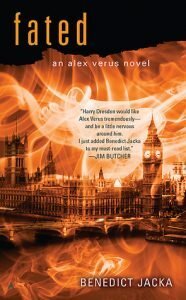 [GdM] It is coming up on ten years since you released Fated, book 1 of Alex Verus. Has your approach to the writing and editing process changed since the first release?
[GdM] It is coming up on ten years since you released Fated, book 1 of Alex Verus. Has your approach to the writing and editing process changed since the first release?
The biggest difference is that I’m a lot pickier now. Back when I wrote the first few Alex Verus books, I tended to write off the top of my head and make things up on the spot. I still do that sometimes, but nowadays I’m a lot more likely to go back and edit it quite heavily before sending it to my publisher.
[GdM] One of the best qualities of the Alex Verus series is the creation of deep familial relationships; it is the epitome of a found family. These relationships prove to be just as crucial in keeping Alex alive as his raw power as a mage. Was it always going to be Variam, Luna, and Anne? Were there any characters that could have been a part of Alex’s inner circle, but it didn’t work as the series progressed?
Luna was (almost) always going to be part of Alex’s inner circle, but that’s not at all true for Variam and Anne—they were experimental characters that I brought in for Book #3 and ended up keeping around because I liked them. Other candidates for Alex’s inner circle were Sonder and Caldera—back when I introduced them in books #1 and #4 respectively, I thought there was a good chance they’d be sticking around with Alex for the long haul. Obviously things didn’t quite work out that way.
[GdM] Aside from Alex, which character did you find most challenging to write?
I always found Alex pretty easy. In books #1 and #2 the one I had most trouble with was Luna, but around the beginning of book #3 something clicked and from then I really enjoyed writing her scenes. From that point on, the one who was most difficult was probably Anne.
[GdM] I read an AMA on R/Fantasy where someone asked you about Arachne’s personality. You stated that “I’m honestly not sure where Arachne’s personality came from. Fated was a very experimental novel in a lot of ways, and some of the things in there were ones I just threw up completely off the top of my head. Arachne was one of those!” Did Starbreeze and Hermes have similar beginnings?
Hard to remember at this point, but I think so, yes. Starbreeze was a completely random out-of-nowhere creation. Hermes came about because I like foxes, and I like blink dogs (a fairly obscure monster from Dungeons & Dragons) and thought it would be fun to merge the two together.
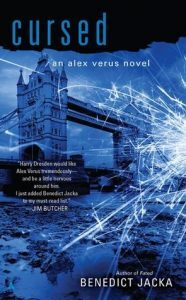 [GdM] You write highly choreographed fight scenes, and it is evident to any reader the love and care you put into them. What is your process like for their creation? Do you hold everything in your head, or do you have to sketch everything out?
[GdM] You write highly choreographed fight scenes, and it is evident to any reader the love and care you put into them. What is your process like for their creation? Do you hold everything in your head, or do you have to sketch everything out?
I hold it all in my head. I spend a lot of time on martial arts and strategy games, so I find that kind of thing pretty intuitive.
[GdM] Marked felt like we entered the end game. Either Alex would be strong enough to fight the end boss, or he was going to die. Was there an “a-ha” scene where you felt like this was the beginning of the end?
The big turning point for me was in book #10, Fallen, where Alex goes back into the same bubble realm that he first visited in Fated, and he’s about to pick up with fateweaver. It’s a short scene and not very flashy, but it’s the last time in the series that you see the “old” Alex.
[GdM] Are there any plot points that you put into the first books that, at the time, were one-off details but that you were able to build upon as the series progressed? And conversely, are there any ideas that you were going to build upon but ended up leaving them as is.
Ones that were originally one-offs but which became important later—the fateweaver from Fated and the monkey’s paw from Cursed are the big ones. I don’t know if there were any plot points that got abandoned, but there were definitely quite a few characters that ended up mostly sidelined because I realized I didn’t enjoy writing them very much, although a lot of them still ended up coming back anyway ( such as Meredith).
[GdM] Was the setting for Alex Verus always London/Camden area?
No, most of the events of Fated were originally set in a fantasy world. My first editor from Orbit UK read an early draft and convinced me that the story would work better as an urban fantasy instead.
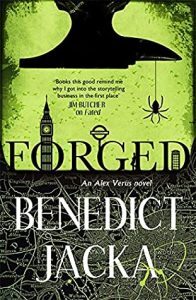 [GdM] What was your favorite scene to write of the series?
[GdM] What was your favorite scene to write of the series?
Probably either Alex’s fight against Onyx and his gang in Fallen, or Alex’s final negotiation with the Council at the end of Forged. I’d been building up to them both for a long time.
[GdM] Alex’s nature becomes increasingly evident in Risen. Instead of characters being black or white, good or evil, it is very apparent that people are shades of gray. Was it great to let go a bit and let Alex dive into his nature’s darker and more ruthless parts?
I did find it satisfying to have Alex cut loose a bit. I’d spent a long time laying the groundwork for it so that it felt earned!
[GdM] Are there any plans for releasing a graphic novel adaptation of the series?
Not at the moment. I’m not sure how well the series would work as a graphic adaptation—so many of the scenes either depend on movement or thought/narration.
[GdM] You have worked with Gildart Jackson repeatedly for the audio adaptions of the series. Did you have any input into whom was selected to voice Alex’s character? Jackson seems like the perfect embodiment of Alex.
The audio adaption was actually done completely by the audio company—I had pretty much no input at all!
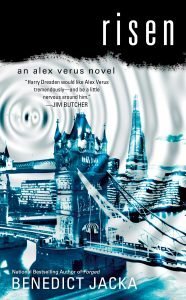 [GdM] You have talked about being excited to work on something new. Do you have any ideas on the horizon you can talk about? Are you taking a break for a bit before starting on the next project?
[GdM] You have talked about being excited to work on something new. Do you have any ideas on the horizon you can talk about? Are you taking a break for a bit before starting on the next project?
I took a brief break at the start of the year, and wrote an Alex Verus novella called Favours, but since then I’ve spent most of my time working on the first book in what’s going to be a new urban fantasy series—I’d actually hoped to have it finished by now, but after getting some feedback from my UK editor I decided to rewrite some elements of it first (it’s a lot easier to fix structural problems if you catch them early). The book’s about 80% done at the moment, and my current plan is to finish the rewrite in December, then hopefully get the last 20% done in January. Publishers take a long time to put things out, thought, so it isn’t likely to be released before early 2022. Hopefully my readers will enjoy Risen enough that when the new series finally comes out, they’ll want to read that too!
Read Risen by Benedict Jacka
Benedict Jacka is half-Australian, half-Armenian, and grew up in London. He’s worked as a teacher, bouncer, and civil servant, and spends his spare time skating and playing tabletop games. He’s the author of the Alex Verus series, including Forged, Fallen, Marked, Bound, and Burned. Learn more online at benedictjacka.co.uk.
The post An Interview With Benedict Jacka appeared first on Grimdark Magazine.
December 7, 2021
REVIEW: Blade Runner 2049
Famously, Ridley Scott and Phillip K. Dick disagreed on the role of androids in their versions of the same story. In Do Androids Dream of Electric Sheep, they represent imperfect copies of human beings. Soulless mockeries of people who resemble more Robert Chalmer’s “philosophical zombie” than actual people. In Ridley Scott’s version, they represent the dehumanization of minorities and people by the elite and upper class.
 There’s been a massive number of interpretations of Blade Runner since it’s release and it’s become one of the most influential films of all time despite being an initial box office bomb. Do Replicants have a soul? Do we? In Christian interpretations of the film, Roy Batty kills God to become his own man but then becomes as Jesus to redeem himself. In a Buddhist interpretation of the film, there’s no self and Roy realizes he and Decker are as one. The fact Decker might be a Replicant himself only highlights this combination. So with a film that has so much baggage, why make a sequel thirty years later? The answer could be money (and probably is for the financiers) but in Blade Runner 2049 director Denis Villeneuve seems to have done so for the art instead.
There’s been a massive number of interpretations of Blade Runner since it’s release and it’s become one of the most influential films of all time despite being an initial box office bomb. Do Replicants have a soul? Do we? In Christian interpretations of the film, Roy Batty kills God to become his own man but then becomes as Jesus to redeem himself. In a Buddhist interpretation of the film, there’s no self and Roy realizes he and Decker are as one. The fact Decker might be a Replicant himself only highlights this combination. So with a film that has so much baggage, why make a sequel thirty years later? The answer could be money (and probably is for the financiers) but in Blade Runner 2049 director Denis Villeneuve seems to have done so for the art instead.
At two hours and forty minutes long, Blade Runner 2049 gets far more into the world building which was only alluded to in the original film. Whereas Blade Runner was primarily influential for its style, its sequel tries to bring to life the planet in ways we didn’t get to observe before. We learn how most people live, eat, breed, and believe in the world of 2049. Villeneuve is clearly in love with the Blade Runner world and I’d argue he’s done an excellent job of extrapolating how it might look thirty years from the moment the elevator doors closed on Sean Young and Harrison Ford in The Final Cut.
But is it good? I think it’s a masterpiece but this is going to be the kind of movie you have to set down and reserve three hours to enjoy. This is a slow paced movie that, honestly, could have been tightened up by at least forty minutes and would have probably lost very little. Really, it feels like two different movies in the same way The Dark Knight Rises did. Honestly, I wouldn’t have minded two films from this movie as while the movie is slow, it’s never boring. It just requires you to pay complete attention if you’re going to get everything you can out of it.
The premise is K (Ryan Gosling) is a Blade Runner in the year 2049. The Tyrell Corporation has gone bankrupt and been bought out by the functionally identical Wallace Corporation. During one of his missions, he discovers evidence of a Replicant who gave birth to a child and he is ordered by his Captain (Robin Wright) to eliminate all evidence of her as a mixed human-Replicant child or even a born Replicant could humanize them too much. The Wallace Corporation, who has been unable to produce breedable Replicants, immediately dispatches their agents to find said child. It isn’t really a spoiler to state the Replicant who gave birth was Rachel (Sean Young) or the father was Rick Deckard (Harrison Ford).
K is an interesting character because he’s basically the Deckard many people believed the “Deckard is a Replicant” character would be. He’s a slave hunter who exists to enjoy the simple pleasures of his 1950s housewife-esque A.I. Joi (Ana de Armas) and doing his job with a stoic professionalism. The existence of the child has a profound effect on him but one that takes a while to manifest. His arc is the central portion of the movie and proceeds in a believable and subtle manner.
I’m one of the viewers who actually doesn’t believe Joi is any more sentient than Siri or Cortana. I believe she’s a program designed to tell him what he wants to here and has as much meaning as a romantic partner as I have with Leliana from Dragon Age or Lara Croft in a self-insert fanfic. Nevertheless, the movie asks us to reflect on what she means to him whether she’s a being with no inner life or not.
I was also fascinated by the character of Luv (Sylvia Hoeks) and found a more intriguing character than K in many ways. The favored slave of Niander Wallace (Jared Leto), she is in the uncertain position of being entirely replacable. I appreciate whenever we get fascinating female villains in movies, especially when their threat doesn’t rely on their sexuality. I actually may have found her a bit too fascinating as I was hoping for a much bigger role for her than that of antagonist. Nevertheless, Sylvia Hoeks is mesmerizing every time she’s on screen.
Fans of Harrison Ford are going to have mixed feelings on the subject because he doesn’t really appear until the third act. Even so, he makes excellent use of his time and I think he had a lot of fun in the film. I actually have a photo of the filming where he accidentally clocks Ryan Gosling during one of their fight scenes and his embarrassment.
Are there any flaws? I think the movie could have been tighter and I’m not actually all that sold on the “science” of it or the implications. The idea a Replicant being capable of having the children of humans strikes me as less revolutionary than it might be given they seem so human as is and plenty of persecuted minorities have children with their persecutors yet that didn’t do them a damn bit of good. Yet, certainly, I understand why it meant a great deal to the Replicants.
There’s a good number of sub-themes spread throughout the movie I felt were worthy of discussion. These include environmentalism, objectification, and poverty. One of the more seemingly extraneous parts of the film has K visit a massive child labor sweatshop in the middle of America where thousands of children are forced to disassemble electronics for food. These aren’t Replicants, who are at least valuable property, but the children of the destitute who are left to fend for themselves. It’s a reminder of man’s inhumanity to man being every bit as vile in this setting as it is to their creation.
Some viewers have criticized the movie’s handling of female characters and I think that’s a really bizarre field to choose as a battleground. This is a movie with more female parts than men and all of them with great variety. Joi and Mariette are sex workers but the movie is in large part about objectification. I do think Robin Wright’s character should have ordered K to sleep with her during one scene because the way the scene resolved didn’t work for me but, otherwise, this is a society where sex is just another commodity people are forced to traffic in.
Visually, the film is stunning and there’s a lot of long tracking shots of the environment. Oddly, a few of the scenes felt a bit out of place like the fact the planet has a massive solar farm which is bigger than anything in our coal guzzling world. Apparently, humans in this world have learned to get past their oil guzzling ways. There’s also little bits of world building which worked well like the fact K has his own apartment in the worst part of town but its still nicely furnished and more than many homeless humans loitering outside his home have.
Action-wise, there’s not much to speak of as the fights are incredibly short but brutal. K is superhuman so he can take a pounding which other, regular, humans can’t but he’s usually quite brutal in dispatching his foes. This isn’t an action movie, though, but a mystery and there’s only a few such scenes peppered through the film. Still, one of the few parts of the film which could have been cut for time is a long fight scene between Deckard and K in the middle of a crumbling casino. While I’m sure Harrison Ford wants to get these in while he can–I think it would have been better just focusing on their words.
In conclusion, I really enjoyed this movie and think it’s a worthy sequel to the original. This movie didn’t do great in theaters but I hope it will find itself a new life on DVD and streaming. So, definitely pick it up if you have the chance.
Watch Blade Runner 2049
The post REVIEW: Blade Runner 2049 appeared first on Grimdark Magazine.
December 6, 2021
REVIEW: The Complete Chronicles of Conan
For sword-swinging, camel-punching action, there’s no protagonist who looms quite as large in the history of fantasy as Conan the Barbarian. Of course, he’s quite different in the books than the films—more cunning, more aware of deception. While I love the film, it’s a shame it looms so large in the public imagination compared to the fiction.
[image error]Every scrap, poem, and paper has been put into The Complete Chronicles of Conan. It takes the publication order of these stories, instead of the chronological approach that had been tried by L. Sprague de Camp.
This gives the whole book a feeling of sitting around listening to someone tell stories. It’s rare for someone to tell their life story in one long methodical rush, and this less methodical approach feels far more evocative for someone like Conan. We get stories of Conan being the King of Aquilonia, we get stories of Conan as a youth. We see him as a pirate with Belit, and a thief, all out of order but fitting together regardless.
Robert E. Howard’s writing style was crisp and vibrant. His mastery of action scenes is well-discussed, but he made even the smaller scenes strong. Background description made his Hyborean Age come alive. He was an absolute master of pacing, and even his longer works maintained a constant momentum throughout. His characters were never complex, but they were stark and bold.
With the exception of The Hour of the Dragon, they’re all short stories. In addition, The Complete Chronicles of Conan has three stories—Drums of Tombalku, Wolves Beyond the Border, and The Snout in the Dark—that are drafts, The Hall of the Dead, which is just a synopsis, and The Hand of Nergal, which is just a fragment of a never-finished story.
Of all the Conan stories, The Tower of the Elephant is one of the most famous, and feels the most like the ur-text for all other Conan stories. Conan and a thief team up to rob a wealthy wizard of his treasure, and that wizard has powers, and victims, greater than expected.
“’Take your sword, man, and cut out my heart; then squeeze it so that the blood will flow over the red stone. Then go you down these stairs and enter the ebony chamber where Yara sits wrapped in lotus-dreams of evil. Speak his name and he will awaken. Then lay this gem before him, and say, “Yag-kosha gives you a last gift and a last enchantment.” Then get you from the tower quickly; fear not, your way shall be made clear. The life of man is not the life of Yag, nor is human death the death of Yag. Let me be free of this cage of broken blind flesh, and I will once more be Yogah of Yag, morning-crowned and shining, with wings to fly, and feet to dance, and eyes to see, and hands to break.”
I am also a fan of the very similar story Rogues in the House, which adds in the twist of an angry and intelligent ape. Red Nails, another classic, has both a dragon and an ongoing blood feud between two factions in a secret city.
Read The Complete Chronicles of Conan by Robert E. Howard
If you liked this, you should try:
Gollancz also put out a book called Conan’s Brethren that features Bran Mak Morn, Kull the Conqueror, Solomon Kane, and several of Howard’s historical stories as well.
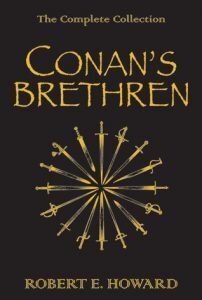 My absolute favorite story that Robert E Howard ever wrote is Worms of the Earth, a Bran Mak Morn story about how far the leader of a dying people should go for revenge. After a couple of his people are crucified by Romans, Bran Mak Morn embarks on a quest to see revenge through, including making a deal with a terrifying witch.
My absolute favorite story that Robert E Howard ever wrote is Worms of the Earth, a Bran Mak Morn story about how far the leader of a dying people should go for revenge. After a couple of his people are crucified by Romans, Bran Mak Morn embarks on a quest to see revenge through, including making a deal with a terrifying witch.
“There was a stir, a seething in the writhing shadows, and from the darkness crept, like a four-legged animal, a human shape that fell down and groveled at Bran’s feet and writhed and mowed, and lifting a death’s-head, howled like a dying dog. In the ghastly light, Bran, soul-shaken, saw the blank glassy eyes, the bloodless features, the loose, writhing, froth-covered lips of sheer lunacy—gods, was this Titus Sulla, the proud lord of life and death in Eboracum’s proud city?
Bran bared his sword.
“I had thought to give this stroke in vengeance,” he said somberly. “I give it in mercy—Vale Caesar!“
Howard was one of the undisputed masters of sword and sorcery, and is worth the read nearly a century later. All of these stories are old, and plenty are in the public domain on Project Gutenberg. But despite that age difference the writing remains as vivid as it ever did.
Read Conan’s Brethren by Robert E. Howard
The post REVIEW: The Complete Chronicles of Conan appeared first on Grimdark Magazine.
December 5, 2021
REVIEW: Darkdawn by Jay Kristoff
The concluding volume of The Nevernight Chronicle has cemented the view in my mind that Jay Kristoff deserves to be placed among the great grimdark authors. Darkdawn is a brilliant conclusion to the trilogy, it answers every question, ties off every loose thread, and does so in a witty, violent, and thoroughly engrossing way. Darkdawn is the promised crescendo of Mia’s story and it does not disappoint.
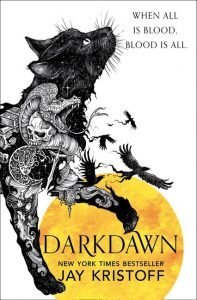 One of my absolute favourite things that I have discovered about Jay Kristoff’s writing through completing The Nevernight Chronicle is how hilariously self-aware he is. The opening page for example has the chronicler apologise for the ‘state’ the reader was left in at the end of Godsgrave and that they ‘seemed quite upset’ (which was true) and later on comments such as ‘it’s actually not a bad read. I mean if you don’t mind footnotes and a fuckload of cursing’ or ‘you can tell it was written by a man’ because of the way the sex scenes are described, provide not only some much needed light heartedness in the novel but also shows that Kristoff is clearly aware of some of the biggest criticisms of the trilogy and uses it to his advantage. As someone who quite liked the footnotes and does not mind the swearing, I found it hilarious.
One of my absolute favourite things that I have discovered about Jay Kristoff’s writing through completing The Nevernight Chronicle is how hilariously self-aware he is. The opening page for example has the chronicler apologise for the ‘state’ the reader was left in at the end of Godsgrave and that they ‘seemed quite upset’ (which was true) and later on comments such as ‘it’s actually not a bad read. I mean if you don’t mind footnotes and a fuckload of cursing’ or ‘you can tell it was written by a man’ because of the way the sex scenes are described, provide not only some much needed light heartedness in the novel but also shows that Kristoff is clearly aware of some of the biggest criticisms of the trilogy and uses it to his advantage. As someone who quite liked the footnotes and does not mind the swearing, I found it hilarious.
The reader has known from the outset of the first novel that Mia will die. So it is not a spoiler to say that it happens in Darkdawn and that the whole novel builds up to the final promised battle between Mia and her nemesis, Consul Julius Scaeva. But even having known since the start of the first novel such a huge part of how it ends, the denouement of Darkdawn was still fantastic. There were twists, turns and heart breaking surprises even up to the final pages.
Just because the ending was truly an epic conclusion does not mean that Darkdawn was a slow burn novel in any way. The story begins straight after the concluding events of Godsgrave with Mia in the bowels of the gladiator arena and sprints straight in to the action. Darkdawn has a much faster pace than its predecessors and maintains a sense of earnestness and import until the grand finale. Reading it felt in some ways like a mirror of the events of the novel, with no safe place to stop, a huge sense of urgency and near constant tension. Firstly, I think this relentless speed comes because Darkdawn mostly follows the present timeline of Mia’s life and having already provided us with all the supporting information Kristoff has less need to back fill our knowledge gaps to progress the narrative. The reduced use of footnotes also helps speed up the reader and move them through the narrative quicker than in the earlier novels. Even the physical layout of the book encourages them to just keep on going. In Nevernight and Godsgrave when a chapter ended the remainder of the page was left blank so the end of chapters were good pausing points. Whereas in Darkdawn the next chapter begins straight away, with only the chapter subtitle stopping you from just reading on that little bit. Almost every time that meant I continued to read even though I really wanted to savour every sentence the novel had to offer.
I have said in my earlier review of Nevernight that I liked that it read more like an entertaining biography than a fictional novel. This has grown in Darkdawn through the revelation that the chronicle is a metafiction. The chronicler’s identity is discovered early on in Darkdawn and how this is done and the revelation that series is actually a novel within a novel was so utterly surprising that I gave up trying to predict how the journey was going to unfurl and decided to just enjoy the ride.
And what a ride gentlefriends. The more traditional structure of Darkdawn made it seem grand and all-encompassing in a way that the first two novel were not. It felt like a true epic, with Mia and her allies journeying across different places in Itreya, gathering allies, fending off Illuminati, winning some fights, losing others. The final battle was as destructive as it has been promised to be from the beginning, and it was an exceptionally written clash of titans. Even having anticipated it all the way through the series I was utterly invested in how that final battle played out.
Darkdawn was a bittersweet read; I loved almost every word of it. At times it broke my heart, I did not want it to end, but I wanted there to be a happy ending (which as we know is rare in grimdark). I desperately wanted to keep some characters safe, I was glad to see the gruesome demise of others. It is a hugely satisfying end to the trilogy and although Mia’s story is complete, I still want more from this world and if Jay Kristoff ever does return to the Red Church I will gladly devour that novel too.
Read Darkdawn by Jay Kristoff
The post REVIEW: Darkdawn by Jay Kristoff appeared first on Grimdark Magazine.



